
Reading for Meaning 5-7 day lesson by Joyce Jackson.
- Subject:
- Elementary Education
- Reading Informational Text
- Speaking and Listening
- Material Type:
- Lesson Plan
- Author:
- Stephanie Genco
- Date Added:
- 08/14/2018

Reading for Meaning 5-7 day lesson by Joyce Jackson.
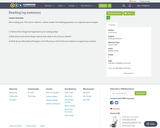
After reading your 'free choice' selection - please answer the following questions on a separate piece of paper. 1) Tell me three things that happened in your reading today? 2) Why did you pick those things? How do they relate to the story as a whole?3) What do you will predict will happen next? Why do you think that? (use evidence to support your answer)
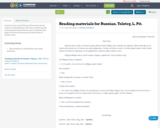
A text of a short story Pit by Leo Tolstoy that may be used for teaching Russian. The text is marked up with stressing marks and includes a short vocabulary that helps to find in the dictionary the initial forms of Russian verbs

This resource was created by Judy Miller and Rachel Palmer, in collaboration with Dawn DeTurk, Hannah Blomstedt, and Julie Albrecht, as part of ESU2's Integrating the Arts project. This project is a four year initiative focused on integrating arts into the core curriculum through teacher education, practice, and coaching.

This resource was created by Judy Miller and Rachel Palmer, in collaboration with Dawn DeTurk, Hannah Blomstedt, and Julie Albrecht, as part of ESU2's Integrating the Arts project. This project is a four year initiative focused on integrating arts into the core curriculum through teacher education, practice, and coaching.
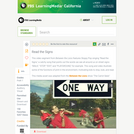
In this video segment from Between the Lions, Sloppy Pop's song Read the Signs spotlights the letters and words we see on signs every day, encouraging children to be aware of print in their environment.
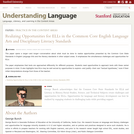
This paper opens a larger conversation about what must be done to realize opportunities presented by the Common Core State Standards in English Language Arts and the literacy standards in other subject areas. It emphasizes the simultaneous challenges and opportunities for ELLs.The paper emphasizes that texts are approached differently for different purposes. Students need opportunities to approach texts with these varied purposes in mind. It also highlights how ELLs may be well served by opportunities to explore and justify their own textual hypotheses, even if their initial interpretations diverge from those of the teacher.
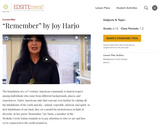
This lesson plan is the ninth in the "Incredible Bridges: Poets Creating Community" series. It provides a video recording of the poet, Joy Harjo, reading the poem "Remember." The companion lesson contains a sequence of activities for use with secondary students before, during, and after reading to help them enter and experience the poem.
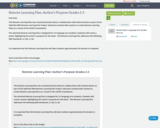
This Remote Learning Plan was created by Denise Klaus in collaboration with Andrew Easton as part of the 2020 ESU-NDE Remote Learning Plan Project. Educators worked with coaches to create Remote Learning Plans as a result of the COVID-19 pandemic.The attached Remote Learning Plan is designed for 2-3 language arts students. Students will create a poster highlighting the author's purpose for this book . This Remote Learning Plan addresses the following NDE Standards: 2.1.6b, 3.1.6a It is expected that this Remote Learning Plan will take students approximately 30 minutes to complete. Here is the direct link to the Google Doc:https://docs.google.com/presentation/d/19ibWr840q603hrbptIRxjdNo2rZofNLHABL_QCUWrvg/edit#slide=id.p1
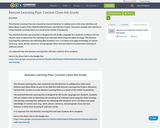
This Remote Learning Plan was created by Hannah Barnhart in collaboration with Caryn Ziettlow and Eileen Barks as part of the 2020 ESU-NDE Remote Learning Plan Project. Educators worked with coaches to create Remote Learning Plans as a result of the COVID-19 pandemic.The attached Remote Learning Plan is designed for 6th Grade Language Arts students. Students will use context clues to determine the meaning of an unknown word using the IDEAS Strategy. This Remote Learning Plan addresses the following NDE Standard: LA 6.1.5.b Select and apply knowledge of context clues (e.g., word, phrase, sentence, and paragraph clues) and text features to determine meaning of unknown words.It is expected that this Remote Learning Plan will take students 40 to complete.Here is the direct link to the Google Doc: https://docs.google.com/presentation/d/13d23NUCf8s9Thd6nh7RlfkAAHKHN3798m8KviNbaSZM/edit?usp=sharing
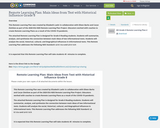
This Remote Learning Plan was created by Elizabeth Loehr in collaboration with Eileen Barks and Caryn Ziettlow as part of the 2020 ESU-NDE Remote Learning Plan Project. Educators worked with coaches to create Remote Learning Plans as a result of the COVID-19 pandemic.The attached Remote Learning Plan is designed for Grade 8 Reading students. Students will summarize, analyze, and synthesize the connection between main ideas of two informational texts. Students will analyze the social, historical, cultural, and biographical influences in informational texts. This Remote Learning Plan addresses the following NDE Standard: LA 8.1.6.e and LA 8.1.6.h It is expected that this Remote Learning Plan will take students 45 minutes to complete. Here is the direct link to the Google Doc: https://drive.google.com/file/d/1ekYpo8pbtwoRwl90uBSkI9lvmrLsA2UQ/view?usp=sharing
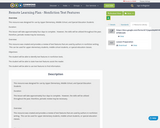
This resource was designed for use by Upper Elementary, Middle School, and Special Education StudentsDuration: This lesson will take approximately four days to complete. However, the skills will be utilized throughout the year; therefore, periodic review may be necessary.Overview: This resource was created and provides a review of text features that are used by authors in nonfiction writing. This can be used for upper elementary students, middle school students, or special education classes.Objectives:The student will be able to identify text features in nonfiction texts.The student will be able to state how text features assist the reader.The student will be able to use text features to find information.
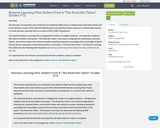
This Remote Learning Plan was created by Sara Wellman-High Horse in collaboration with Eileen Barks and Caryn Ziettlow as part of the 2020 ESU-NDE Remote Learning Plan Project. Educators worked with coaches to create Remote Learning Plans as a result of the COVID-19 pandemic.The attached Remote Learning Plan is designed for Grade 9-12 English students. Via HyperDoc, Students will study the Robert Frost poem, “The Road Not Taken” and research biographical information, personal letters, and scholar videos and articles to answer analytical questions; and apply their knowledge of poetic literary devices and poem traits/characteristics to the poem, “The Road Not Taken”. This Remote Learning Plan addresses the following NDE Standard: LA 12.1.6.c; LA 12.1.6.d; LA 12.1.6.f; LA 12.1.6.i; LA 12.1.6.l; LA 12.1.6.nIt is expected that this Remote Learning Plan will take students 2 days to complete.Here is the direct link to the Google Doc: Robert Frost & "The Road Not Taken"
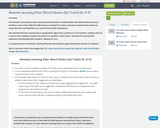
This Remote Learning Plan was created by Denise Mixdorf in collaboration with Eileen Barks and Caryn Ziettlow as part of the 2020 ESU-NDE Remote Learning Plan Project. Educators worked with coaches to create Remote Learning Plans as a result of the COVID-19 pandemic.The attached Remote Learning Plan is designed for high school, grades 9-12, ELA students. Students will use a text or their writing to analyze the author's or speaker's word choice. This Remote Learning Plan addresses the following NDE Standard: Reading 12.1.5.d It is expected that this Remote Learning Plan will take students approximately 90 minutes to complete.Here is the direct link to the Google Doc: Six Traits: Word Choice Lesson Plan and Six Traits: Word Choice Google Slides Resource

This resource was created by Brenda Sebade, in collaboration with Dawn DeTurk, Hannah Blomstedt, and Julie Albrecht, as part of ESU2's Integrating the Arts project. This project is a four year initiative focused on integrating arts into the core curriculum through teacher education, practice, and coaching.
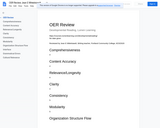
Review of Developmental Reading, Lumen Learning
https://drive.google.com/open?id=1a4vYx-WB6T4FhbguYlDKWGIsrqGoWMfbn8vTtIsh4Gk
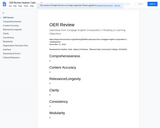
Review of OpenNow from Cengage English Composition 2 Reading & Learning Objectives
https://drive.google.com/open?id=1R3lBo2FVvMsU-RXdTIMTjUyFqX9JGemrxgySiAsWq5A
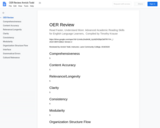
Review of Read Faster, Understand More: Advanced Academic Reading Skills for English Language Learners, Compiled by Timothy Krause
https://drive.google.com/open?id=19WtDY1yYGOywwWp0GOooDbJqj8a5_MtW9_ENlg777Gc
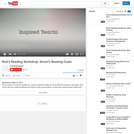
Amori wants to move her reading up a level so she'll be ready for more difficult material in 6th grade. Rick shows her how certain spellings can help her with pronunciation, an area shes been having trouble with.
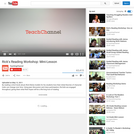
By reading a short book aloud, Rick Kleine models for his students how their initial theories of character traits can change over time. Using peer discussion and class participation, the kids are engaged throughout, giving them what Rick hopes will be a life-long love of reading.